Analysis of Care Principles & Good Practice in Healthcare Settings
VerifiedAdded on 2023/06/12
|11
|3284
|321
Essay
AI Summary
This essay provides a detailed exploration of the principles of care and good practice within health and social care settings. It discusses key principles such as effective communication, respect, dignity, choice, equality, and confidentiality, linking them to Maslow's hierarchy of needs. The essay also examines the impacts of key legislation, policies, and codes of conduct on ethical practices in healthcare. Furthermore, it evaluates the rights and autonomy of vulnerable individuals and the importance of risk assessment in safeguarding them from harm or neglect. The significance of anti-discriminatory practices and the consequences of abuse are also addressed, emphasizing the need for ethical and respectful healthcare delivery.
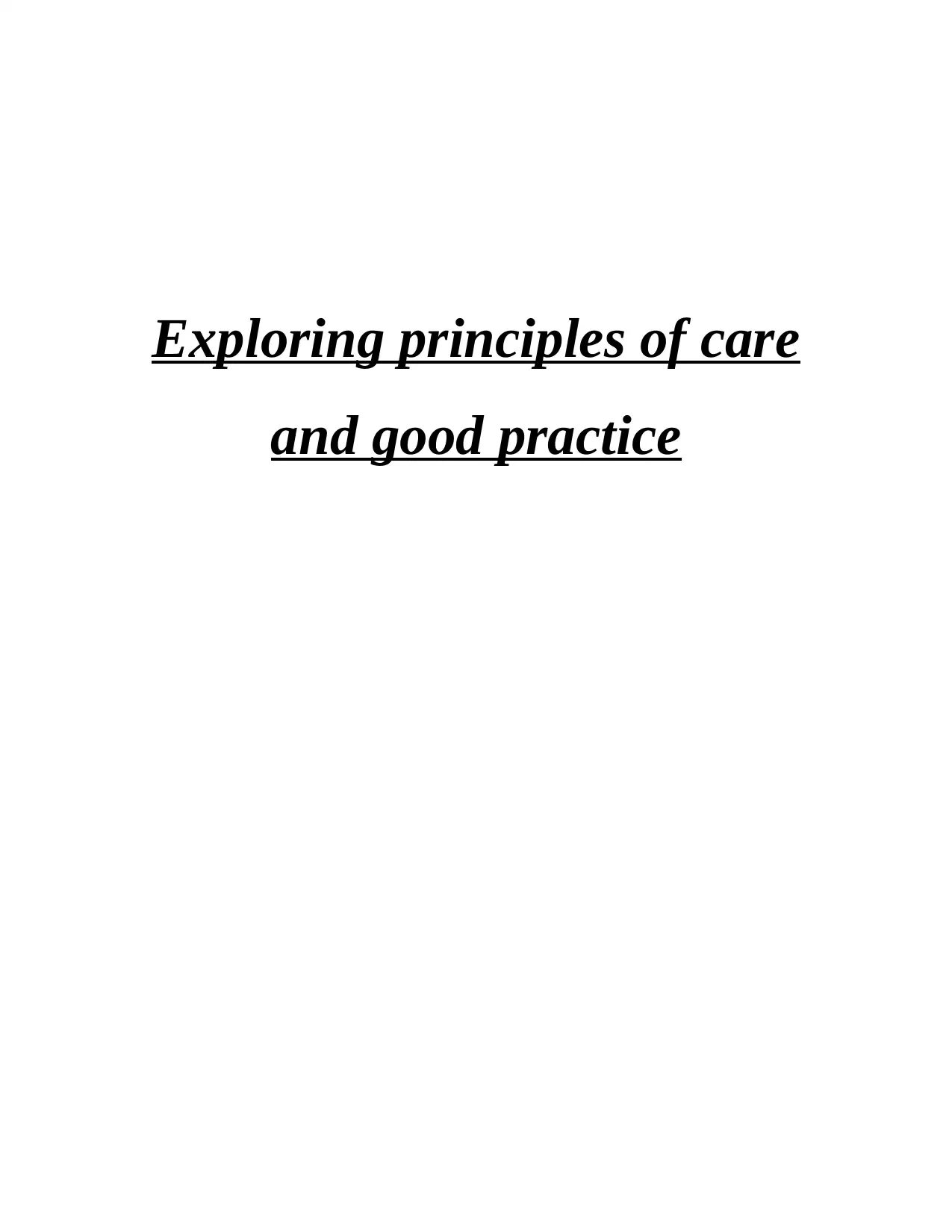
Exploring principles of care
and good practice
and good practice
Paraphrase This Document
Need a fresh take? Get an instant paraphrase of this document with our AI Paraphraser

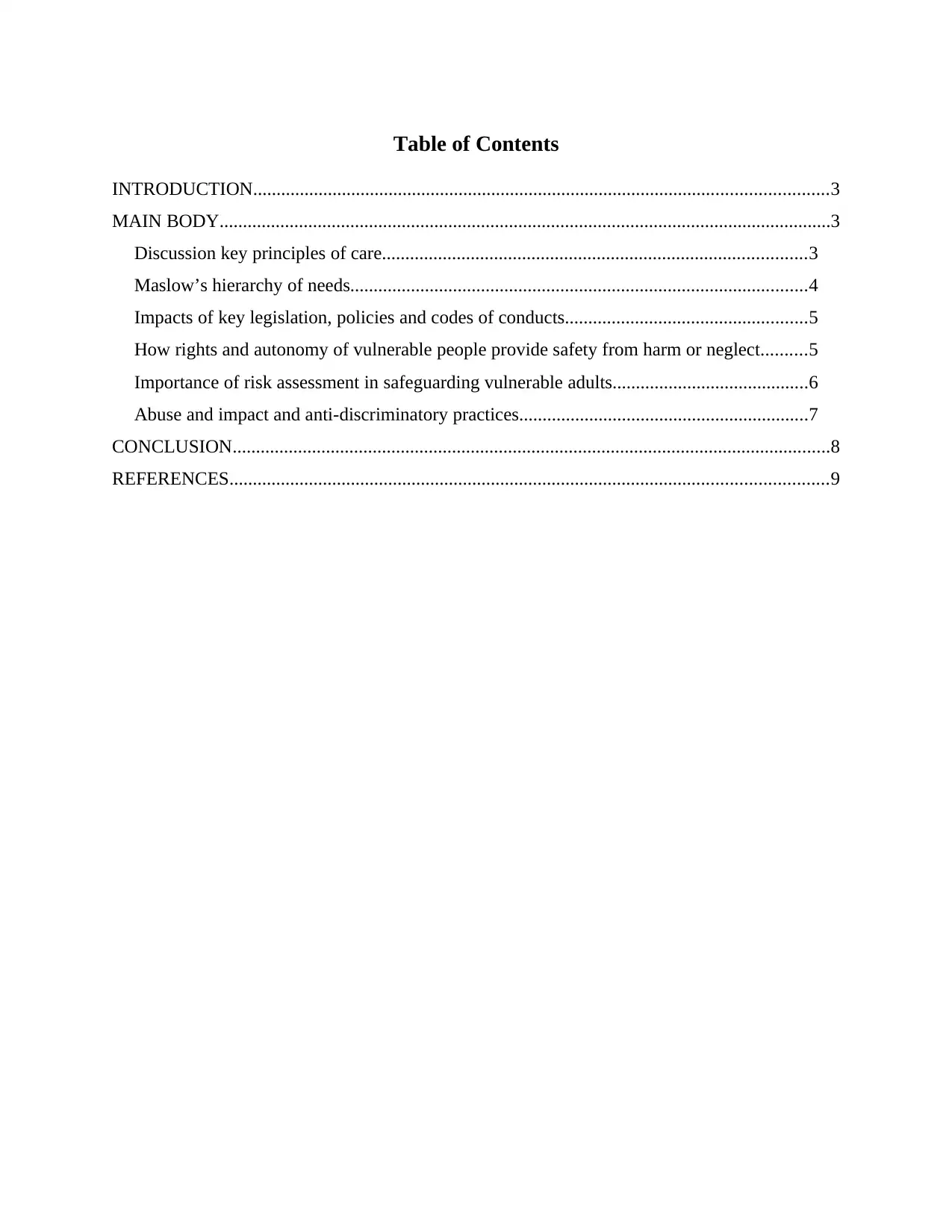
Table of Contents
INTRODUCTION...........................................................................................................................3
MAIN BODY...................................................................................................................................3
Discussion key principles of care...........................................................................................3
Maslow’s hierarchy of needs..................................................................................................4
Impacts of key legislation, policies and codes of conducts....................................................5
How rights and autonomy of vulnerable people provide safety from harm or neglect..........5
Importance of risk assessment in safeguarding vulnerable adults..........................................6
Abuse and impact and anti-discriminatory practices..............................................................7
CONCLUSION................................................................................................................................8
REFERENCES................................................................................................................................9
INTRODUCTION...........................................................................................................................3
MAIN BODY...................................................................................................................................3
Discussion key principles of care...........................................................................................3
Maslow’s hierarchy of needs..................................................................................................4
Impacts of key legislation, policies and codes of conducts....................................................5
How rights and autonomy of vulnerable people provide safety from harm or neglect..........5
Importance of risk assessment in safeguarding vulnerable adults..........................................6
Abuse and impact and anti-discriminatory practices..............................................................7
CONCLUSION................................................................................................................................8
REFERENCES................................................................................................................................9
⊘ This is a preview!⊘
Do you want full access?
Subscribe today to unlock all pages.

Trusted by 1+ million students worldwide
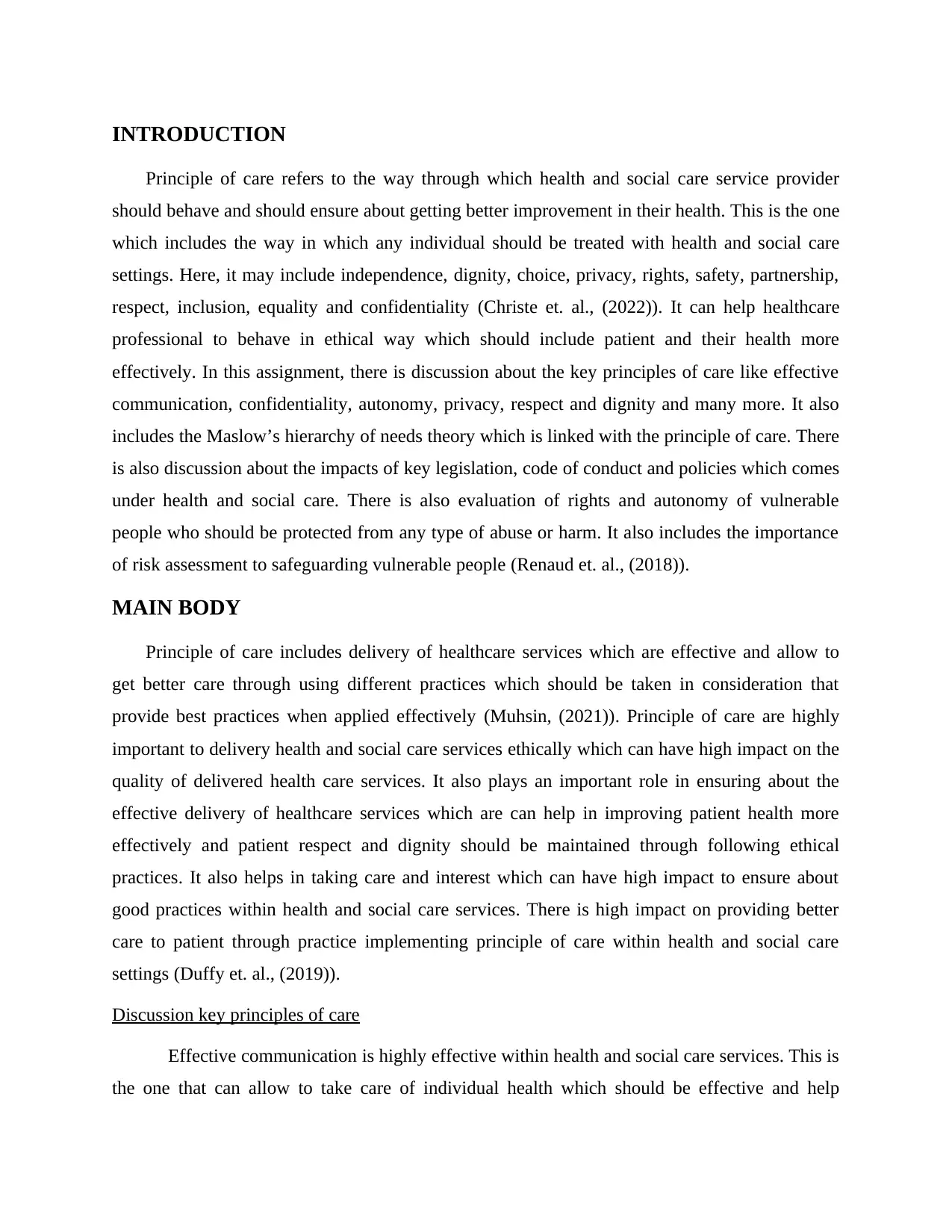
INTRODUCTION
Principle of care refers to the way through which health and social care service provider
should behave and should ensure about getting better improvement in their health. This is the one
which includes the way in which any individual should be treated with health and social care
settings. Here, it may include independence, dignity, choice, privacy, rights, safety, partnership,
respect, inclusion, equality and confidentiality (Christe et. al., (2022)). It can help healthcare
professional to behave in ethical way which should include patient and their health more
effectively. In this assignment, there is discussion about the key principles of care like effective
communication, confidentiality, autonomy, privacy, respect and dignity and many more. It also
includes the Maslow’s hierarchy of needs theory which is linked with the principle of care. There
is also discussion about the impacts of key legislation, code of conduct and policies which comes
under health and social care. There is also evaluation of rights and autonomy of vulnerable
people who should be protected from any type of abuse or harm. It also includes the importance
of risk assessment to safeguarding vulnerable people (Renaud et. al., (2018)).
MAIN BODY
Principle of care includes delivery of healthcare services which are effective and allow to
get better care through using different practices which should be taken in consideration that
provide best practices when applied effectively (Muhsin, (2021)). Principle of care are highly
important to delivery health and social care services ethically which can have high impact on the
quality of delivered health care services. It also plays an important role in ensuring about the
effective delivery of healthcare services which are can help in improving patient health more
effectively and patient respect and dignity should be maintained through following ethical
practices. It also helps in taking care and interest which can have high impact to ensure about
good practices within health and social care services. There is high impact on providing better
care to patient through practice implementing principle of care within health and social care
settings (Duffy et. al., (2019)).
Discussion key principles of care
Effective communication is highly effective within health and social care services. This is
the one that can allow to take care of individual health which should be effective and help
Principle of care refers to the way through which health and social care service provider
should behave and should ensure about getting better improvement in their health. This is the one
which includes the way in which any individual should be treated with health and social care
settings. Here, it may include independence, dignity, choice, privacy, rights, safety, partnership,
respect, inclusion, equality and confidentiality (Christe et. al., (2022)). It can help healthcare
professional to behave in ethical way which should include patient and their health more
effectively. In this assignment, there is discussion about the key principles of care like effective
communication, confidentiality, autonomy, privacy, respect and dignity and many more. It also
includes the Maslow’s hierarchy of needs theory which is linked with the principle of care. There
is also discussion about the impacts of key legislation, code of conduct and policies which comes
under health and social care. There is also evaluation of rights and autonomy of vulnerable
people who should be protected from any type of abuse or harm. It also includes the importance
of risk assessment to safeguarding vulnerable people (Renaud et. al., (2018)).
MAIN BODY
Principle of care includes delivery of healthcare services which are effective and allow to
get better care through using different practices which should be taken in consideration that
provide best practices when applied effectively (Muhsin, (2021)). Principle of care are highly
important to delivery health and social care services ethically which can have high impact on the
quality of delivered health care services. It also plays an important role in ensuring about the
effective delivery of healthcare services which are can help in improving patient health more
effectively and patient respect and dignity should be maintained through following ethical
practices. It also helps in taking care and interest which can have high impact to ensure about
good practices within health and social care services. There is high impact on providing better
care to patient through practice implementing principle of care within health and social care
settings (Duffy et. al., (2019)).
Discussion key principles of care
Effective communication is highly effective within health and social care services. This is
the one that can allow to take care of individual health which should be effective and help
Paraphrase This Document
Need a fresh take? Get an instant paraphrase of this document with our AI Paraphraser
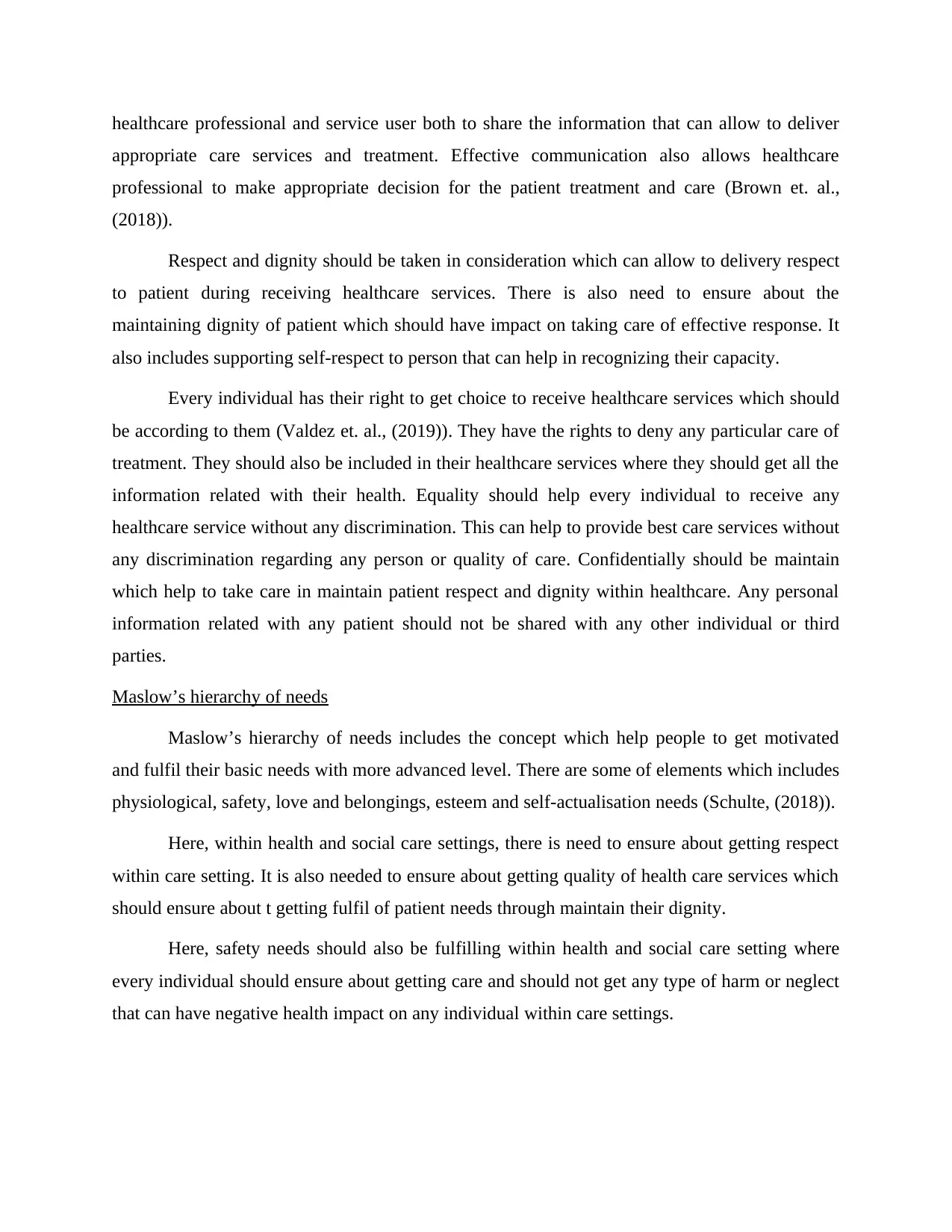
healthcare professional and service user both to share the information that can allow to deliver
appropriate care services and treatment. Effective communication also allows healthcare
professional to make appropriate decision for the patient treatment and care (Brown et. al.,
(2018)).
Respect and dignity should be taken in consideration which can allow to delivery respect
to patient during receiving healthcare services. There is also need to ensure about the
maintaining dignity of patient which should have impact on taking care of effective response. It
also includes supporting self-respect to person that can help in recognizing their capacity.
Every individual has their right to get choice to receive healthcare services which should
be according to them (Valdez et. al., (2019)). They have the rights to deny any particular care of
treatment. They should also be included in their healthcare services where they should get all the
information related with their health. Equality should help every individual to receive any
healthcare service without any discrimination. This can help to provide best care services without
any discrimination regarding any person or quality of care. Confidentially should be maintain
which help to take care in maintain patient respect and dignity within healthcare. Any personal
information related with any patient should not be shared with any other individual or third
parties.
Maslow’s hierarchy of needs
Maslow’s hierarchy of needs includes the concept which help people to get motivated
and fulfil their basic needs with more advanced level. There are some of elements which includes
physiological, safety, love and belongings, esteem and self-actualisation needs (Schulte, (2018)).
Here, within health and social care settings, there is need to ensure about getting respect
within care setting. It is also needed to ensure about getting quality of health care services which
should ensure about t getting fulfil of patient needs through maintain their dignity.
Here, safety needs should also be fulfilling within health and social care setting where
every individual should ensure about getting care and should not get any type of harm or neglect
that can have negative health impact on any individual within care settings.
appropriate care services and treatment. Effective communication also allows healthcare
professional to make appropriate decision for the patient treatment and care (Brown et. al.,
(2018)).
Respect and dignity should be taken in consideration which can allow to delivery respect
to patient during receiving healthcare services. There is also need to ensure about the
maintaining dignity of patient which should have impact on taking care of effective response. It
also includes supporting self-respect to person that can help in recognizing their capacity.
Every individual has their right to get choice to receive healthcare services which should
be according to them (Valdez et. al., (2019)). They have the rights to deny any particular care of
treatment. They should also be included in their healthcare services where they should get all the
information related with their health. Equality should help every individual to receive any
healthcare service without any discrimination. This can help to provide best care services without
any discrimination regarding any person or quality of care. Confidentially should be maintain
which help to take care in maintain patient respect and dignity within healthcare. Any personal
information related with any patient should not be shared with any other individual or third
parties.
Maslow’s hierarchy of needs
Maslow’s hierarchy of needs includes the concept which help people to get motivated
and fulfil their basic needs with more advanced level. There are some of elements which includes
physiological, safety, love and belongings, esteem and self-actualisation needs (Schulte, (2018)).
Here, within health and social care settings, there is need to ensure about getting respect
within care setting. It is also needed to ensure about getting quality of health care services which
should ensure about t getting fulfil of patient needs through maintain their dignity.
Here, safety needs should also be fulfilling within health and social care setting where
every individual should ensure about getting care and should not get any type of harm or neglect
that can have negative health impact on any individual within care settings.
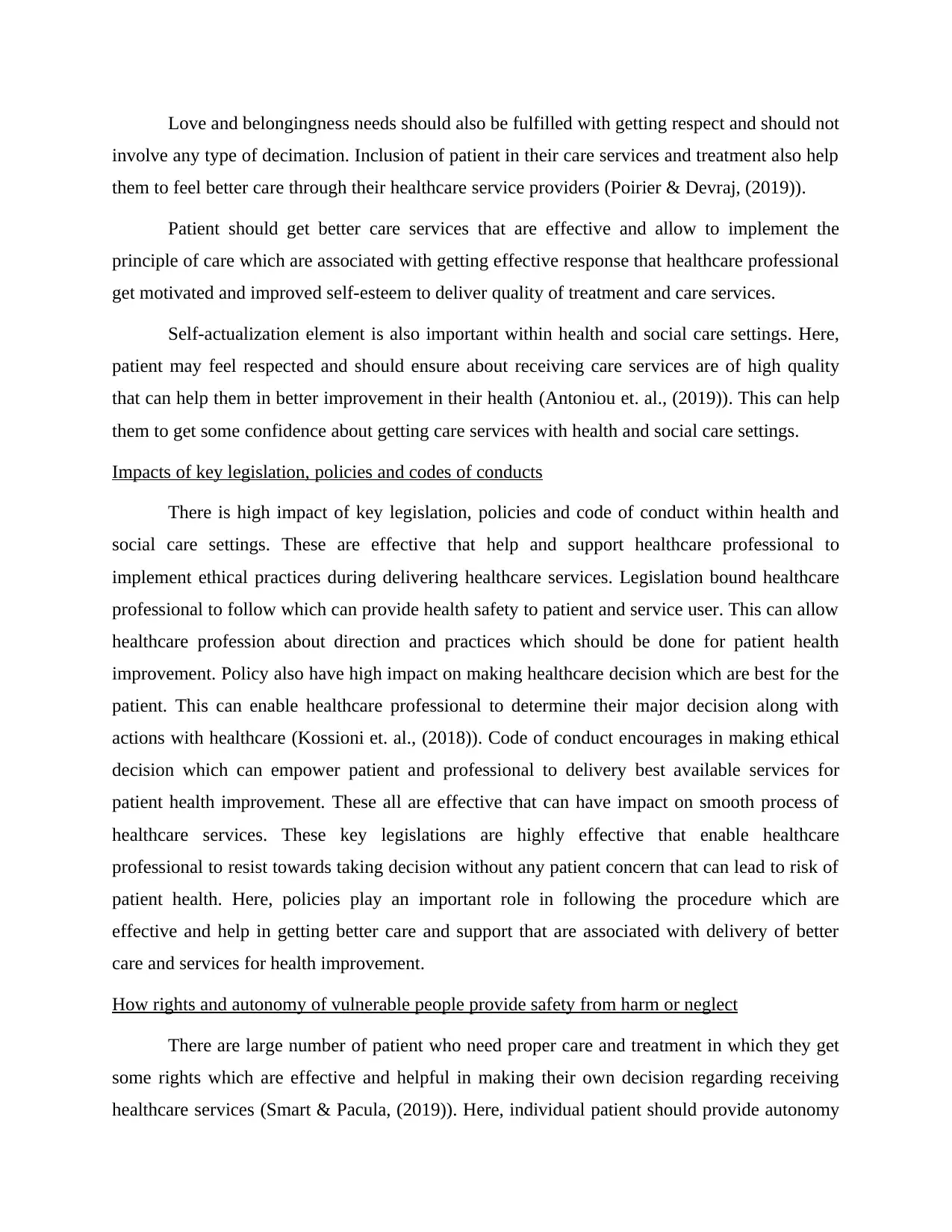
Love and belongingness needs should also be fulfilled with getting respect and should not
involve any type of decimation. Inclusion of patient in their care services and treatment also help
them to feel better care through their healthcare service providers (Poirier & Devraj, (2019)).
Patient should get better care services that are effective and allow to implement the
principle of care which are associated with getting effective response that healthcare professional
get motivated and improved self-esteem to deliver quality of treatment and care services.
Self-actualization element is also important within health and social care settings. Here,
patient may feel respected and should ensure about receiving care services are of high quality
that can help them in better improvement in their health (Antoniou et. al., (2019)). This can help
them to get some confidence about getting care services with health and social care settings.
Impacts of key legislation, policies and codes of conducts
There is high impact of key legislation, policies and code of conduct within health and
social care settings. These are effective that help and support healthcare professional to
implement ethical practices during delivering healthcare services. Legislation bound healthcare
professional to follow which can provide health safety to patient and service user. This can allow
healthcare profession about direction and practices which should be done for patient health
improvement. Policy also have high impact on making healthcare decision which are best for the
patient. This can enable healthcare professional to determine their major decision along with
actions with healthcare (Kossioni et. al., (2018)). Code of conduct encourages in making ethical
decision which can empower patient and professional to delivery best available services for
patient health improvement. These all are effective that can have impact on smooth process of
healthcare services. These key legislations are highly effective that enable healthcare
professional to resist towards taking decision without any patient concern that can lead to risk of
patient health. Here, policies play an important role in following the procedure which are
effective and help in getting better care and support that are associated with delivery of better
care and services for health improvement.
How rights and autonomy of vulnerable people provide safety from harm or neglect
There are large number of patient who need proper care and treatment in which they get
some rights which are effective and helpful in making their own decision regarding receiving
healthcare services (Smart & Pacula, (2019)). Here, individual patient should provide autonomy
involve any type of decimation. Inclusion of patient in their care services and treatment also help
them to feel better care through their healthcare service providers (Poirier & Devraj, (2019)).
Patient should get better care services that are effective and allow to implement the
principle of care which are associated with getting effective response that healthcare professional
get motivated and improved self-esteem to deliver quality of treatment and care services.
Self-actualization element is also important within health and social care settings. Here,
patient may feel respected and should ensure about receiving care services are of high quality
that can help them in better improvement in their health (Antoniou et. al., (2019)). This can help
them to get some confidence about getting care services with health and social care settings.
Impacts of key legislation, policies and codes of conducts
There is high impact of key legislation, policies and code of conduct within health and
social care settings. These are effective that help and support healthcare professional to
implement ethical practices during delivering healthcare services. Legislation bound healthcare
professional to follow which can provide health safety to patient and service user. This can allow
healthcare profession about direction and practices which should be done for patient health
improvement. Policy also have high impact on making healthcare decision which are best for the
patient. This can enable healthcare professional to determine their major decision along with
actions with healthcare (Kossioni et. al., (2018)). Code of conduct encourages in making ethical
decision which can empower patient and professional to delivery best available services for
patient health improvement. These all are effective that can have impact on smooth process of
healthcare services. These key legislations are highly effective that enable healthcare
professional to resist towards taking decision without any patient concern that can lead to risk of
patient health. Here, policies play an important role in following the procedure which are
effective and help in getting better care and support that are associated with delivery of better
care and services for health improvement.
How rights and autonomy of vulnerable people provide safety from harm or neglect
There are large number of patient who need proper care and treatment in which they get
some rights which are effective and helpful in making their own decision regarding receiving
healthcare services (Smart & Pacula, (2019)). Here, individual patient should provide autonomy
⊘ This is a preview!⊘
Do you want full access?
Subscribe today to unlock all pages.

Trusted by 1+ million students worldwide
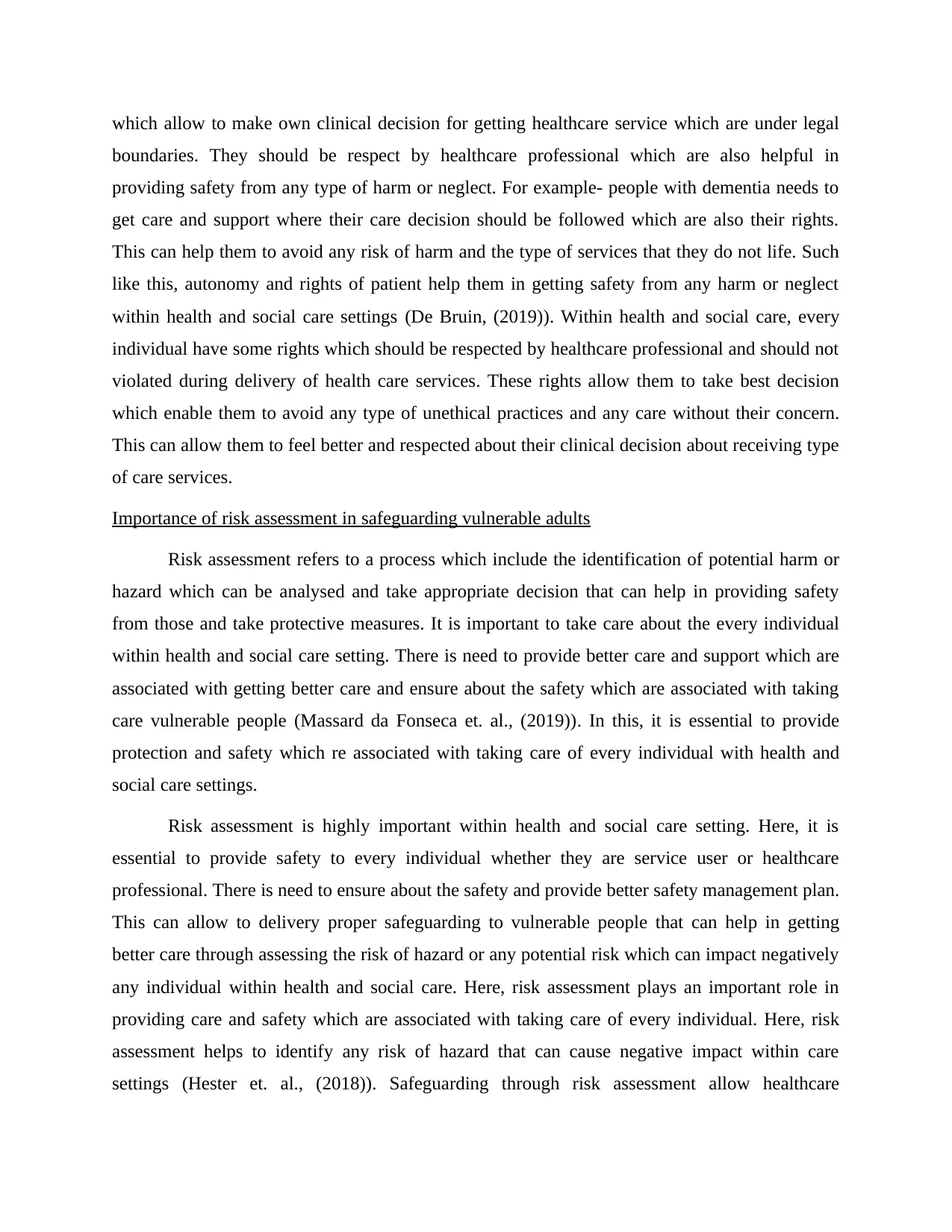
which allow to make own clinical decision for getting healthcare service which are under legal
boundaries. They should be respect by healthcare professional which are also helpful in
providing safety from any type of harm or neglect. For example- people with dementia needs to
get care and support where their care decision should be followed which are also their rights.
This can help them to avoid any risk of harm and the type of services that they do not life. Such
like this, autonomy and rights of patient help them in getting safety from any harm or neglect
within health and social care settings (De Bruin, (2019)). Within health and social care, every
individual have some rights which should be respected by healthcare professional and should not
violated during delivery of health care services. These rights allow them to take best decision
which enable them to avoid any type of unethical practices and any care without their concern.
This can allow them to feel better and respected about their clinical decision about receiving type
of care services.
Importance of risk assessment in safeguarding vulnerable adults
Risk assessment refers to a process which include the identification of potential harm or
hazard which can be analysed and take appropriate decision that can help in providing safety
from those and take protective measures. It is important to take care about the every individual
within health and social care setting. There is need to provide better care and support which are
associated with getting better care and ensure about the safety which are associated with taking
care vulnerable people (Massard da Fonseca et. al., (2019)). In this, it is essential to provide
protection and safety which re associated with taking care of every individual with health and
social care settings.
Risk assessment is highly important within health and social care setting. Here, it is
essential to provide safety to every individual whether they are service user or healthcare
professional. There is need to ensure about the safety and provide better safety management plan.
This can allow to delivery proper safeguarding to vulnerable people that can help in getting
better care through assessing the risk of hazard or any potential risk which can impact negatively
any individual within health and social care. Here, risk assessment plays an important role in
providing care and safety which are associated with taking care of every individual. Here, risk
assessment helps to identify any risk of hazard that can cause negative impact within care
settings (Hester et. al., (2018)). Safeguarding through risk assessment allow healthcare
boundaries. They should be respect by healthcare professional which are also helpful in
providing safety from any type of harm or neglect. For example- people with dementia needs to
get care and support where their care decision should be followed which are also their rights.
This can help them to avoid any risk of harm and the type of services that they do not life. Such
like this, autonomy and rights of patient help them in getting safety from any harm or neglect
within health and social care settings (De Bruin, (2019)). Within health and social care, every
individual have some rights which should be respected by healthcare professional and should not
violated during delivery of health care services. These rights allow them to take best decision
which enable them to avoid any type of unethical practices and any care without their concern.
This can allow them to feel better and respected about their clinical decision about receiving type
of care services.
Importance of risk assessment in safeguarding vulnerable adults
Risk assessment refers to a process which include the identification of potential harm or
hazard which can be analysed and take appropriate decision that can help in providing safety
from those and take protective measures. It is important to take care about the every individual
within health and social care setting. There is need to provide better care and support which are
associated with getting better care and ensure about the safety which are associated with taking
care vulnerable people (Massard da Fonseca et. al., (2019)). In this, it is essential to provide
protection and safety which re associated with taking care of every individual with health and
social care settings.
Risk assessment is highly important within health and social care setting. Here, it is
essential to provide safety to every individual whether they are service user or healthcare
professional. There is need to ensure about the safety and provide better safety management plan.
This can allow to delivery proper safeguarding to vulnerable people that can help in getting
better care through assessing the risk of hazard or any potential risk which can impact negatively
any individual within health and social care. Here, risk assessment plays an important role in
providing care and safety which are associated with taking care of every individual. Here, risk
assessment helps to identify any risk of hazard that can cause negative impact within care
settings (Hester et. al., (2018)). Safeguarding through risk assessment allow healthcare
Paraphrase This Document
Need a fresh take? Get an instant paraphrase of this document with our AI Paraphraser
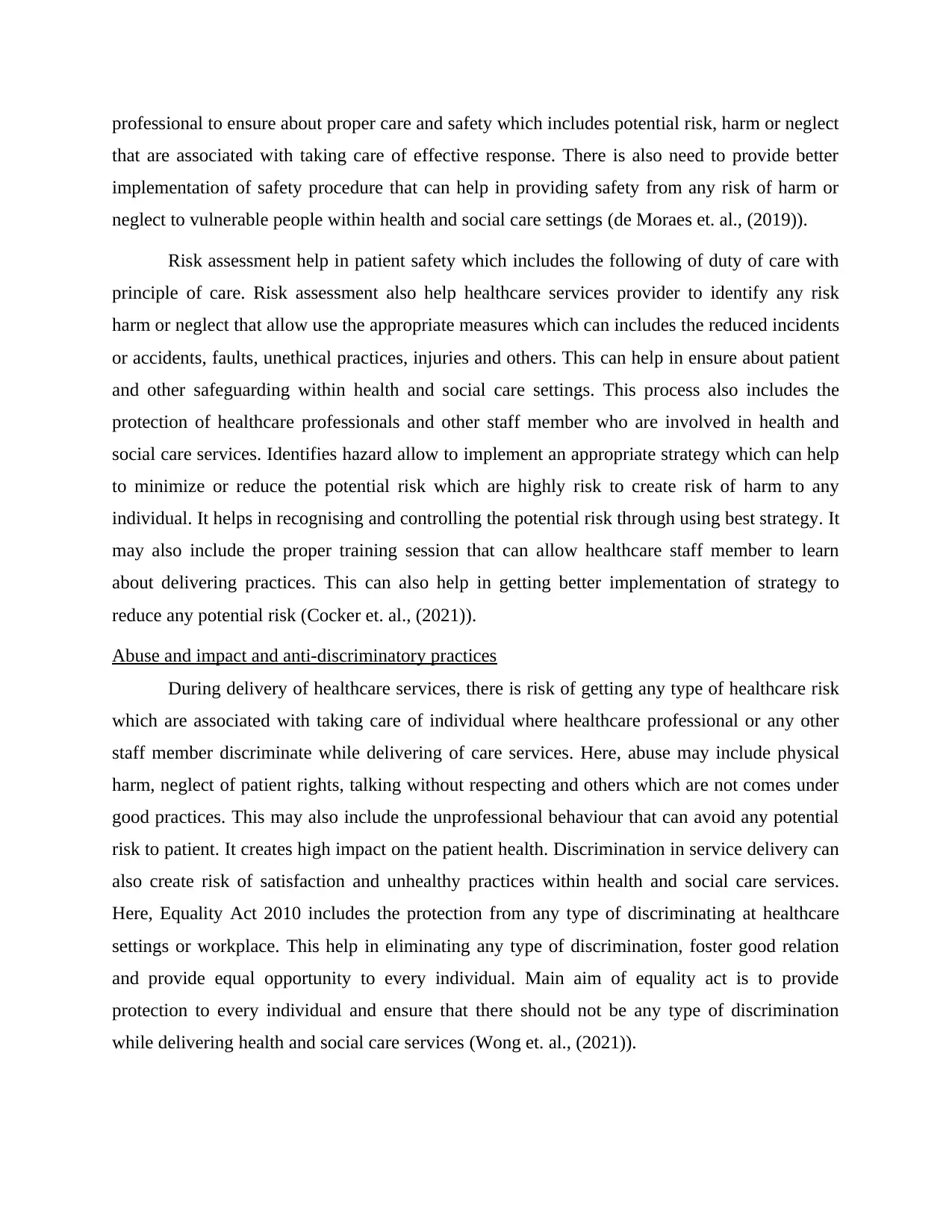
professional to ensure about proper care and safety which includes potential risk, harm or neglect
that are associated with taking care of effective response. There is also need to provide better
implementation of safety procedure that can help in providing safety from any risk of harm or
neglect to vulnerable people within health and social care settings (de Moraes et. al., (2019)).
Risk assessment help in patient safety which includes the following of duty of care with
principle of care. Risk assessment also help healthcare services provider to identify any risk
harm or neglect that allow use the appropriate measures which can includes the reduced incidents
or accidents, faults, unethical practices, injuries and others. This can help in ensure about patient
and other safeguarding within health and social care settings. This process also includes the
protection of healthcare professionals and other staff member who are involved in health and
social care services. Identifies hazard allow to implement an appropriate strategy which can help
to minimize or reduce the potential risk which are highly risk to create risk of harm to any
individual. It helps in recognising and controlling the potential risk through using best strategy. It
may also include the proper training session that can allow healthcare staff member to learn
about delivering practices. This can also help in getting better implementation of strategy to
reduce any potential risk (Cocker et. al., (2021)).
Abuse and impact and anti-discriminatory practices
During delivery of healthcare services, there is risk of getting any type of healthcare risk
which are associated with taking care of individual where healthcare professional or any other
staff member discriminate while delivering of care services. Here, abuse may include physical
harm, neglect of patient rights, talking without respecting and others which are not comes under
good practices. This may also include the unprofessional behaviour that can avoid any potential
risk to patient. It creates high impact on the patient health. Discrimination in service delivery can
also create risk of satisfaction and unhealthy practices within health and social care services.
Here, Equality Act 2010 includes the protection from any type of discriminating at healthcare
settings or workplace. This help in eliminating any type of discrimination, foster good relation
and provide equal opportunity to every individual. Main aim of equality act is to provide
protection to every individual and ensure that there should not be any type of discrimination
while delivering health and social care services (Wong et. al., (2021)).
that are associated with taking care of effective response. There is also need to provide better
implementation of safety procedure that can help in providing safety from any risk of harm or
neglect to vulnerable people within health and social care settings (de Moraes et. al., (2019)).
Risk assessment help in patient safety which includes the following of duty of care with
principle of care. Risk assessment also help healthcare services provider to identify any risk
harm or neglect that allow use the appropriate measures which can includes the reduced incidents
or accidents, faults, unethical practices, injuries and others. This can help in ensure about patient
and other safeguarding within health and social care settings. This process also includes the
protection of healthcare professionals and other staff member who are involved in health and
social care services. Identifies hazard allow to implement an appropriate strategy which can help
to minimize or reduce the potential risk which are highly risk to create risk of harm to any
individual. It helps in recognising and controlling the potential risk through using best strategy. It
may also include the proper training session that can allow healthcare staff member to learn
about delivering practices. This can also help in getting better implementation of strategy to
reduce any potential risk (Cocker et. al., (2021)).
Abuse and impact and anti-discriminatory practices
During delivery of healthcare services, there is risk of getting any type of healthcare risk
which are associated with taking care of individual where healthcare professional or any other
staff member discriminate while delivering of care services. Here, abuse may include physical
harm, neglect of patient rights, talking without respecting and others which are not comes under
good practices. This may also include the unprofessional behaviour that can avoid any potential
risk to patient. It creates high impact on the patient health. Discrimination in service delivery can
also create risk of satisfaction and unhealthy practices within health and social care services.
Here, Equality Act 2010 includes the protection from any type of discriminating at healthcare
settings or workplace. This help in eliminating any type of discrimination, foster good relation
and provide equal opportunity to every individual. Main aim of equality act is to provide
protection to every individual and ensure that there should not be any type of discrimination
while delivering health and social care services (Wong et. al., (2021)).
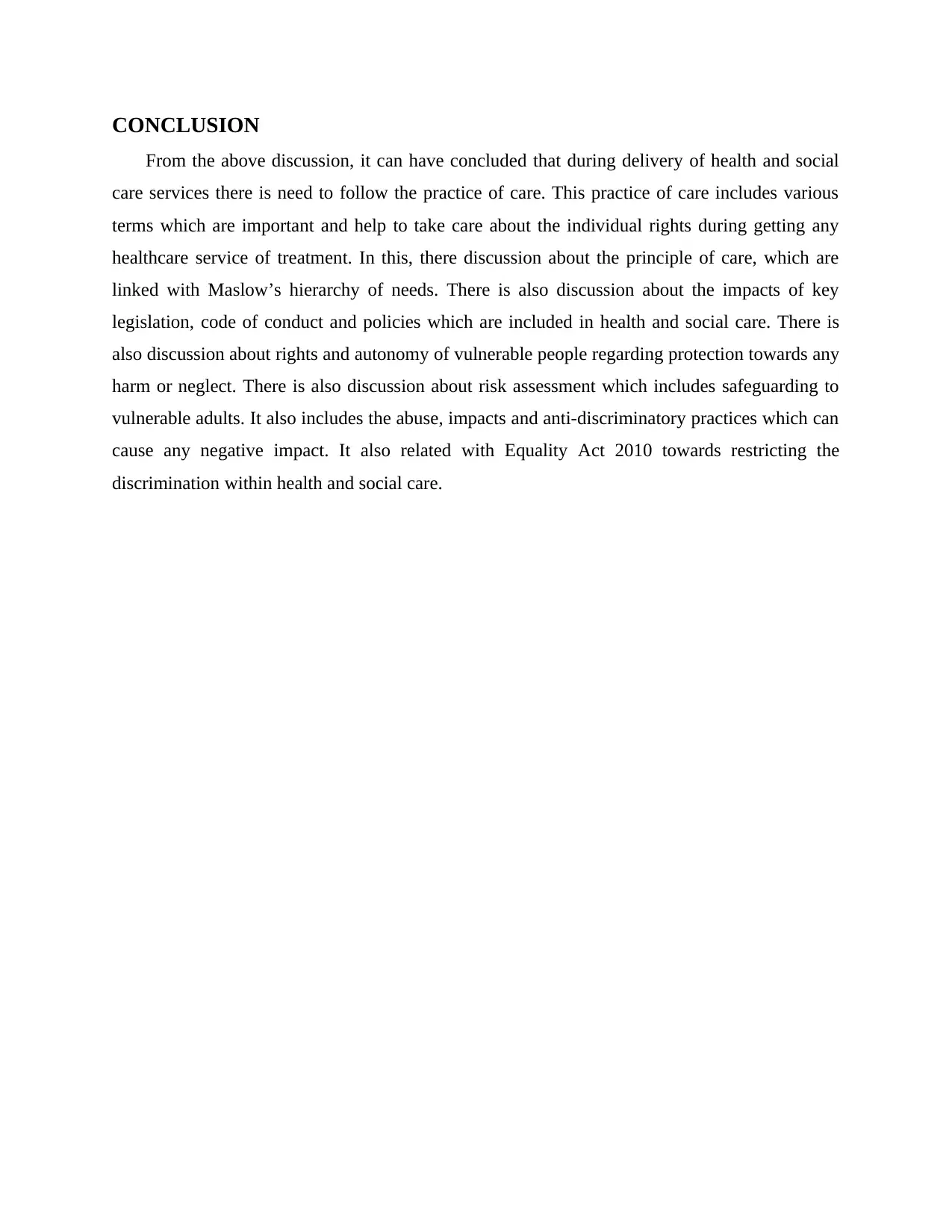
CONCLUSION
From the above discussion, it can have concluded that during delivery of health and social
care services there is need to follow the practice of care. This practice of care includes various
terms which are important and help to take care about the individual rights during getting any
healthcare service of treatment. In this, there discussion about the principle of care, which are
linked with Maslow’s hierarchy of needs. There is also discussion about the impacts of key
legislation, code of conduct and policies which are included in health and social care. There is
also discussion about rights and autonomy of vulnerable people regarding protection towards any
harm or neglect. There is also discussion about risk assessment which includes safeguarding to
vulnerable adults. It also includes the abuse, impacts and anti-discriminatory practices which can
cause any negative impact. It also related with Equality Act 2010 towards restricting the
discrimination within health and social care.
From the above discussion, it can have concluded that during delivery of health and social
care services there is need to follow the practice of care. This practice of care includes various
terms which are important and help to take care about the individual rights during getting any
healthcare service of treatment. In this, there discussion about the principle of care, which are
linked with Maslow’s hierarchy of needs. There is also discussion about the impacts of key
legislation, code of conduct and policies which are included in health and social care. There is
also discussion about rights and autonomy of vulnerable people regarding protection towards any
harm or neglect. There is also discussion about risk assessment which includes safeguarding to
vulnerable adults. It also includes the abuse, impacts and anti-discriminatory practices which can
cause any negative impact. It also related with Equality Act 2010 towards restricting the
discrimination within health and social care.
⊘ This is a preview!⊘
Do you want full access?
Subscribe today to unlock all pages.

Trusted by 1+ million students worldwide
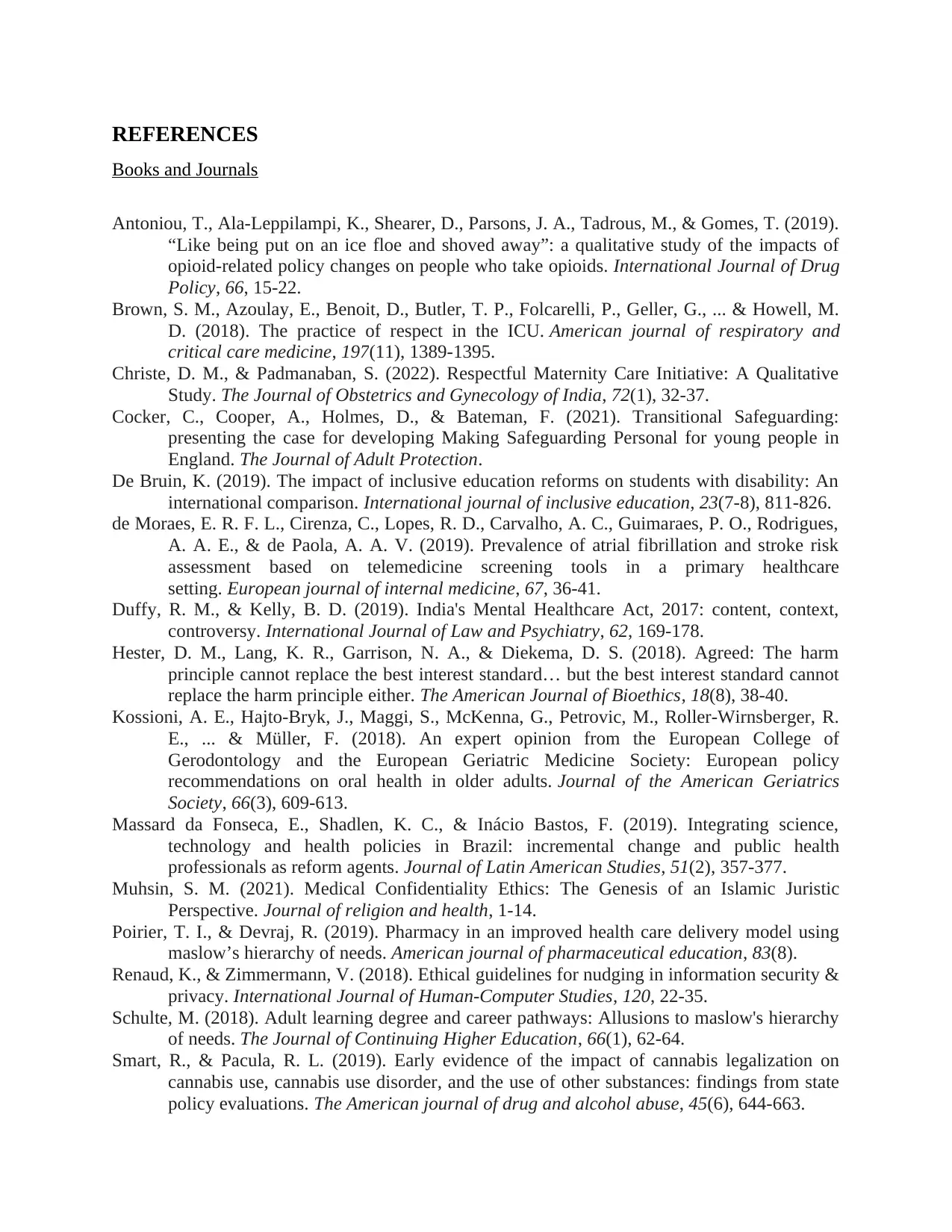
REFERENCES
Books and Journals
Antoniou, T., Ala-Leppilampi, K., Shearer, D., Parsons, J. A., Tadrous, M., & Gomes, T. (2019).
“Like being put on an ice floe and shoved away”: a qualitative study of the impacts of
opioid-related policy changes on people who take opioids. International Journal of Drug
Policy, 66, 15-22.
Brown, S. M., Azoulay, E., Benoit, D., Butler, T. P., Folcarelli, P., Geller, G., ... & Howell, M.
D. (2018). The practice of respect in the ICU. American journal of respiratory and
critical care medicine, 197(11), 1389-1395.
Christe, D. M., & Padmanaban, S. (2022). Respectful Maternity Care Initiative: A Qualitative
Study. The Journal of Obstetrics and Gynecology of India, 72(1), 32-37.
Cocker, C., Cooper, A., Holmes, D., & Bateman, F. (2021). Transitional Safeguarding:
presenting the case for developing Making Safeguarding Personal for young people in
England. The Journal of Adult Protection.
De Bruin, K. (2019). The impact of inclusive education reforms on students with disability: An
international comparison. International journal of inclusive education, 23(7-8), 811-826.
de Moraes, E. R. F. L., Cirenza, C., Lopes, R. D., Carvalho, A. C., Guimaraes, P. O., Rodrigues,
A. A. E., & de Paola, A. A. V. (2019). Prevalence of atrial fibrillation and stroke risk
assessment based on telemedicine screening tools in a primary healthcare
setting. European journal of internal medicine, 67, 36-41.
Duffy, R. M., & Kelly, B. D. (2019). India's Mental Healthcare Act, 2017: content, context,
controversy. International Journal of Law and Psychiatry, 62, 169-178.
Hester, D. M., Lang, K. R., Garrison, N. A., & Diekema, D. S. (2018). Agreed: The harm
principle cannot replace the best interest standard… but the best interest standard cannot
replace the harm principle either. The American Journal of Bioethics, 18(8), 38-40.
Kossioni, A. E., Hajto‐Bryk, J., Maggi, S., McKenna, G., Petrovic, M., Roller‐Wirnsberger, R.
E., ... & Müller, F. (2018). An expert opinion from the European College of
Gerodontology and the European Geriatric Medicine Society: European policy
recommendations on oral health in older adults. Journal of the American Geriatrics
Society, 66(3), 609-613.
Massard da Fonseca, E., Shadlen, K. C., & Inácio Bastos, F. (2019). Integrating science,
technology and health policies in Brazil: incremental change and public health
professionals as reform agents. Journal of Latin American Studies, 51(2), 357-377.
Muhsin, S. M. (2021). Medical Confidentiality Ethics: The Genesis of an Islamic Juristic
Perspective. Journal of religion and health, 1-14.
Poirier, T. I., & Devraj, R. (2019). Pharmacy in an improved health care delivery model using
maslow’s hierarchy of needs. American journal of pharmaceutical education, 83(8).
Renaud, K., & Zimmermann, V. (2018). Ethical guidelines for nudging in information security &
privacy. International Journal of Human-Computer Studies, 120, 22-35.
Schulte, M. (2018). Adult learning degree and career pathways: Allusions to maslow's hierarchy
of needs. The Journal of Continuing Higher Education, 66(1), 62-64.
Smart, R., & Pacula, R. L. (2019). Early evidence of the impact of cannabis legalization on
cannabis use, cannabis use disorder, and the use of other substances: findings from state
policy evaluations. The American journal of drug and alcohol abuse, 45(6), 644-663.
Books and Journals
Antoniou, T., Ala-Leppilampi, K., Shearer, D., Parsons, J. A., Tadrous, M., & Gomes, T. (2019).
“Like being put on an ice floe and shoved away”: a qualitative study of the impacts of
opioid-related policy changes on people who take opioids. International Journal of Drug
Policy, 66, 15-22.
Brown, S. M., Azoulay, E., Benoit, D., Butler, T. P., Folcarelli, P., Geller, G., ... & Howell, M.
D. (2018). The practice of respect in the ICU. American journal of respiratory and
critical care medicine, 197(11), 1389-1395.
Christe, D. M., & Padmanaban, S. (2022). Respectful Maternity Care Initiative: A Qualitative
Study. The Journal of Obstetrics and Gynecology of India, 72(1), 32-37.
Cocker, C., Cooper, A., Holmes, D., & Bateman, F. (2021). Transitional Safeguarding:
presenting the case for developing Making Safeguarding Personal for young people in
England. The Journal of Adult Protection.
De Bruin, K. (2019). The impact of inclusive education reforms on students with disability: An
international comparison. International journal of inclusive education, 23(7-8), 811-826.
de Moraes, E. R. F. L., Cirenza, C., Lopes, R. D., Carvalho, A. C., Guimaraes, P. O., Rodrigues,
A. A. E., & de Paola, A. A. V. (2019). Prevalence of atrial fibrillation and stroke risk
assessment based on telemedicine screening tools in a primary healthcare
setting. European journal of internal medicine, 67, 36-41.
Duffy, R. M., & Kelly, B. D. (2019). India's Mental Healthcare Act, 2017: content, context,
controversy. International Journal of Law and Psychiatry, 62, 169-178.
Hester, D. M., Lang, K. R., Garrison, N. A., & Diekema, D. S. (2018). Agreed: The harm
principle cannot replace the best interest standard… but the best interest standard cannot
replace the harm principle either. The American Journal of Bioethics, 18(8), 38-40.
Kossioni, A. E., Hajto‐Bryk, J., Maggi, S., McKenna, G., Petrovic, M., Roller‐Wirnsberger, R.
E., ... & Müller, F. (2018). An expert opinion from the European College of
Gerodontology and the European Geriatric Medicine Society: European policy
recommendations on oral health in older adults. Journal of the American Geriatrics
Society, 66(3), 609-613.
Massard da Fonseca, E., Shadlen, K. C., & Inácio Bastos, F. (2019). Integrating science,
technology and health policies in Brazil: incremental change and public health
professionals as reform agents. Journal of Latin American Studies, 51(2), 357-377.
Muhsin, S. M. (2021). Medical Confidentiality Ethics: The Genesis of an Islamic Juristic
Perspective. Journal of religion and health, 1-14.
Poirier, T. I., & Devraj, R. (2019). Pharmacy in an improved health care delivery model using
maslow’s hierarchy of needs. American journal of pharmaceutical education, 83(8).
Renaud, K., & Zimmermann, V. (2018). Ethical guidelines for nudging in information security &
privacy. International Journal of Human-Computer Studies, 120, 22-35.
Schulte, M. (2018). Adult learning degree and career pathways: Allusions to maslow's hierarchy
of needs. The Journal of Continuing Higher Education, 66(1), 62-64.
Smart, R., & Pacula, R. L. (2019). Early evidence of the impact of cannabis legalization on
cannabis use, cannabis use disorder, and the use of other substances: findings from state
policy evaluations. The American journal of drug and alcohol abuse, 45(6), 644-663.
Paraphrase This Document
Need a fresh take? Get an instant paraphrase of this document with our AI Paraphraser
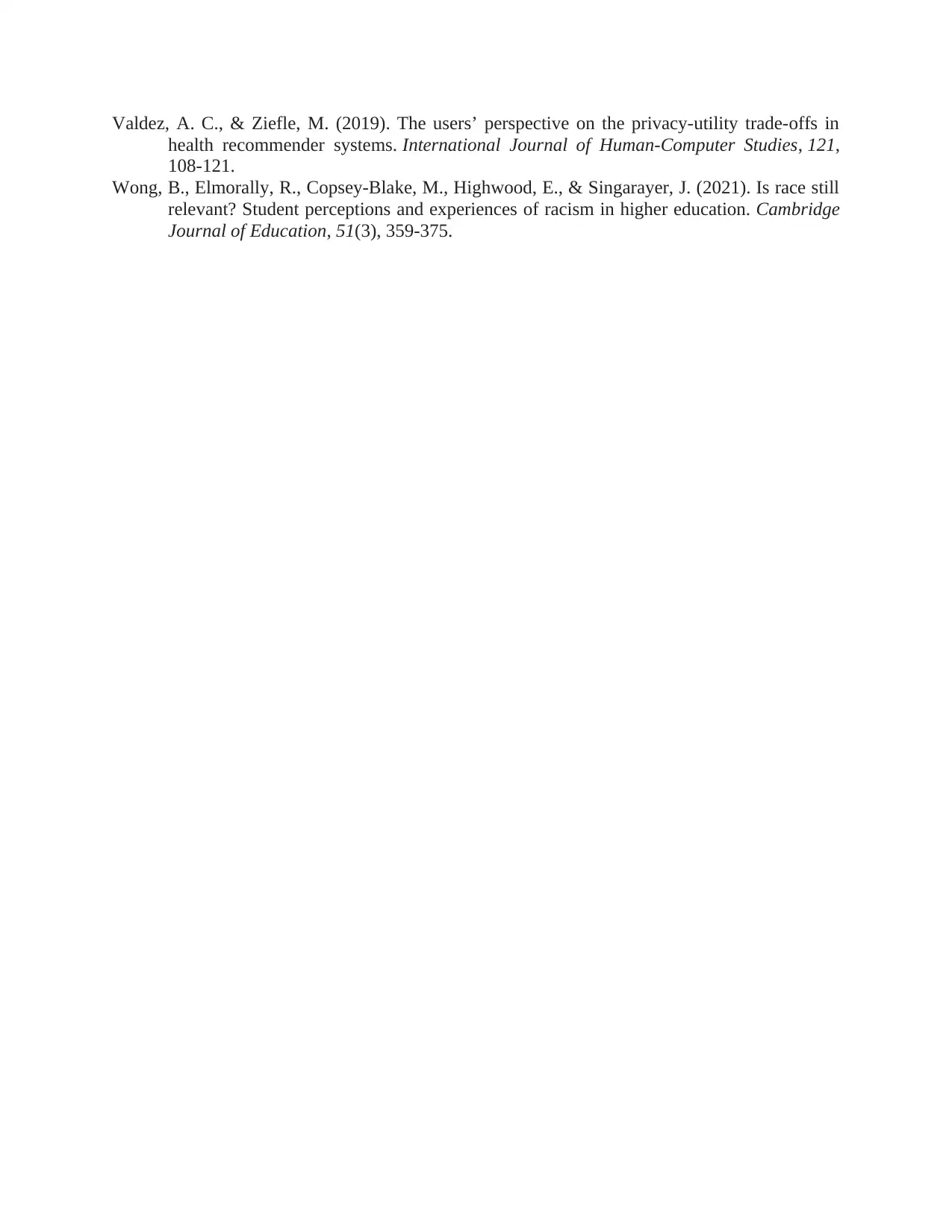
Valdez, A. C., & Ziefle, M. (2019). The users’ perspective on the privacy-utility trade-offs in
health recommender systems. International Journal of Human-Computer Studies, 121,
108-121.
Wong, B., Elmorally, R., Copsey-Blake, M., Highwood, E., & Singarayer, J. (2021). Is race still
relevant? Student perceptions and experiences of racism in higher education. Cambridge
Journal of Education, 51(3), 359-375.
health recommender systems. International Journal of Human-Computer Studies, 121,
108-121.
Wong, B., Elmorally, R., Copsey-Blake, M., Highwood, E., & Singarayer, J. (2021). Is race still
relevant? Student perceptions and experiences of racism in higher education. Cambridge
Journal of Education, 51(3), 359-375.
1 out of 11
Related Documents
Your All-in-One AI-Powered Toolkit for Academic Success.
+13062052269
info@desklib.com
Available 24*7 on WhatsApp / Email
![[object Object]](/_next/static/media/star-bottom.7253800d.svg)
Unlock your academic potential
Copyright © 2020–2026 A2Z Services. All Rights Reserved. Developed and managed by ZUCOL.



